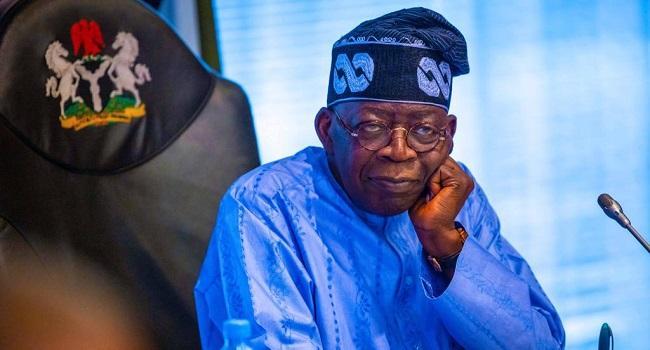By Abba Hamisu Sani
Africa-Press – Nigeria. As Nigeria approaches the 2027 general elections, the political landscape is undergoing significant transformation. This includes the formation of new coalitions among opposition parties and the high-profile defection of Dr. Ifeanyi Okowa, the former PDP Vice Presidential candidate in the 2023 election, along with the incumbent Governor of Delta State, Rt. Hon. Sheriff Oborevwori, to the ruling All Progressives Congress (APC).
There are strong indications that more governors from opposition parties may defect to the APC in the coming months.
Many political observers view these developments as part of President Bola Tinubu’s strategic plan to weaken the opposition ahead of the next electoral cycle.
Okowa and Oborevwori’s Defection: A Blow to the Opposition
The defection of Dr. Ifeanyi Okowa (former Delta State Governor and 2023 PDP Vice Presidential candidate) and incumbent Governor Oborevwori—along with the entire structure of the PDP in Delta State—marks a significant political shift. This development was formally announced by Senator James Manager after a six-hour meeting at the Delta State Government House in Asaba.
“All PDP members in the state, including the Governor, former Governor Okowa, the Speaker, the state party chairman, and all 25 local government chairmen have agreed to move to the APC,” Manager declared.
“We cannot continue to be in a sinking boat.”
A Turning Point in Delta Politics
Delta State Commissioner for Information, Mr. Charles Aniagwu, confirmed the mass defection.
According to him, the decision was made to reposition the state’s developmental agenda.
“There is a need for us to adjust our drinking pattern. The taste of our palm wine has changed, and so must the party from which we drink,” Aniagwu metaphorically explained.
He further emphasized that the move signifies a broader recalibration of South-South politics and hinted at a forthcoming public declaration.
NNPP and LP Grapple with Internal Challenges
Beyond the PDP, other opposition parties such as the Labour Party (LP) and the New Nigeria People’s Party (NNPP) are also facing internal instability and defections.
In Kano State, where the NNPP holds power, prominent figures such as Senator Abdurrahman Kawu Sumaila, Hon. Alhassan Rurum (House of Representatives, Rano/Kibiya/Bunkure), and former Secretary to the State Government, Dr. Baffa Bichi, have all left the party.
Others include Hon. Abdullahi Sani Rogo (Rogo/Karaye Federal Constituency) and several former commissioners.
There is growing speculation that NNPP’s national leader and 2023 presidential candidate, Senator Rabiu Musa Kwankwaso, may be contemplating a return to the APC.
The Labour Party, which finished third in the 2023 presidential election, is similarly experiencing a wave of defections.
Rewriting Delta’s Political History
Political analyst Simon Kolawale, in his piece titled “Defection and Other Matters Arising”, noted that Governor Oborevwori’s defection has fundamentally altered the political trajectory of Delta State, which has been a PDP stronghold since 1999. This is the first time the state will not be governed by the PDP since Nigeria’s return to civilian rule.
With Delta’s shift, only Akwa Ibom, Bayelsa, Enugu, Rivers, and Taraba remain as uninterrupted PDP-governed states. The PDP now controls only 10 states, while the APC governs 23. LP, NNPP, and APGA each control one.
A Historical Perspective on Defections
The first recorded gubernatorial defection in Nigeria occurred in May 1983, when the late Alhaji Abubakar Rimi of Kano State left the PRP for the NPP. He resigned honorably, stating he could not govern under a new party. His deputy, Alhaji Abdu Dawakin Tofa, succeeded him.
The One-Party Debate Rekindled
Oborevwori’s defection has rekindled fears of Nigeria drifting toward a one-party state. While some African leaders historically endorsed one-party systems to promote unity, many analysts argue that such systems often stifle democracy.
“I do not support the one-party system,” Kolawale stated. “While it may have worked in countries like China and Vietnam, other one-party nations such as Cuba, Eritrea, and North Korea have not thrived comparably.”
He added that Nigeria’s complex socio-political makeup makes a multiparty democracy not just preferable, but essential.
APC Responds to Allegations of Power Consolidation
APC National Publicity Secretary, Mr. Felix Morka, rejected claims that the ruling party is attempting to create a one-party state.
“You cannot blame the APC for wooing opposition figures. Blame the opposition for lacking conviction,” Morka said.
The Revolving Door of Party Loyalty
In Nigeria, party loyalty is often fluid. Politicians frequently change allegiances based on strategic interests. Many current APC leaders were once in the PDP, including the APC National Chairman, Dr. Abdullahi Ganduje, who served as Deputy Governor under Rabiu Kwankwaso between 1999–2003 and 2011–2015.
Legal and Cultural Normalization of Defections
Despite constitutional provisions and court rulings meant to regulate defections, they remain deeply embedded in Nigeria’s political culture. No elected official has ever lost a seat due to defection.
“Let us stop deceiving ourselves,” Kolawale argued. “We should amend our laws to reflect the political reality. Nigerians love defections—simple.”
A Mirror of PDP’s Past
Critics accuse the APC of replicating the PDP’s past tactics. From 2003 to 2013, the PDP faced similar accusations of striving to build a one-party system until opposition unity led to its electoral defeat in 2015.
“Lamentations don’t win elections,” Kolawale said. “Opposition figures must bury selfish ambitions and forge a common front.”
Do Governors Decide Presidential Elections?
Kolawale questioned the belief that governors can automatically deliver their states to presidential candidates. Historical data shows that even powerful governors have failed in that regard.
Sule Lamido Warns Against Crippling the Opposition
Former Jigawa State Governor and PDP stalwart, Alhaji Sule Lamido, warned that ongoing efforts to weaken the opposition could mirror actions that historically preceded regime collapse.
In a recent interview with BBC Hausa, Lamido urged President Tinubu to ensure fair political competition.
“He must remember he is the President of all Nigerians,” Lamido said. “Suppressing opposition could backfire.”
The former governor added that opposition parties remain one of the most important elements of democracy. “Crippling the opposition is akin to turning Tinubu’s administration into a quasi-military regime.”
For More News And Analysis About Nigeria Follow Africa-Press







